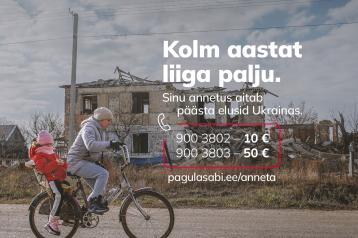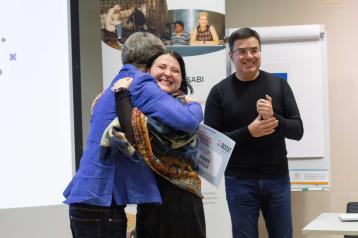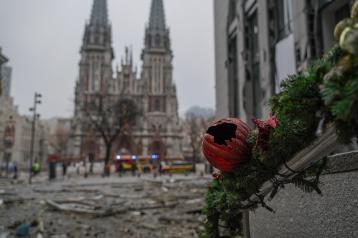- A new season of the entrepreneurship programme Boost will launch in Estonia at the end of February.
- In January, more than 400 refugees participated in adaptation support training sessions in Estonia, with over half of them – 224 – attending legal-themed training.
- With the help of EU funding, we are soon launching four community councils in Armenia to enable people with refugee backgrounds to express their concerns, advocate for solutions to their problems, and participate in decision-making processes that affect them. Additionally, we will form self-help groups for vulnerable refugees.
Ukraine
We provide cash-based assistance, which allows people affected by the war to purchase food, medicines, hygiene products, and other essentials. As of now, we have provided cash-based assistance to nearly 296,000 conflict-affected people, totaling over 53 million euros. Cash assistance is provided for three months, with the support of 3600 Ukrainian hryvnias per household member per month, equivalent to about 80 euros. Registration for assistance is carried out through Estonian Refugee Council's local registration points or via the online application platform. Currently, our focus is on assisting those in need in frontline areas in Zaporizhzhia, Donetsk, Luhansk, Kharkiv, and Kherson oblasts. The programme is funded by the European Union, the USAID's Bureau for Humanitarian Assistance (BHA), Ukraine Humanitarian Fund (UHF), and the Estonian Ministry of Foreign Affairs. Acted is the lead partner for EU and BHA projects.
We have now concluded our winter heating aid programme for the people living near the frontline and hard-to-reach areas in eastern and southern Ukraine. We provided both financial and in-kind support to help cover rising heating costs and ensure fuel supplies for the winter. In January, we supported 816 vulnerable households with cash for heating assistance, with the amount of approximately 330,000 euros. This winter, with the aid starting in September 2024, we assisted more than 5,600 vulnerable households so far. The programme was funded by the European Union, the USAID's Bureau for Humanitarian Assistance (BHA), Ukraine Humanitarian Fund (UHF), and the Estonian Ministry of Foreign Affairs. Acted was the lead partner for EU and BHA projects. NGO YES was the sub-implementing partner for the UHF project. Additionally, the programme was supported by Estonian private donors through the campaign “1000 days of war, 1000 warm homes”.
During January, we supported 88 households (224 individuals) from Kirovohrad, Poltava, Kharkiv, Mykolaiv, Zaporizhzhia, Dnipropetrovsk, and Donetsk oblasts through an Emergency Livelihood Assistance programme, with a total amount exceeding 59,000 euros. The support is aimed at starting or continuing economic activities to improve self-reliance. We are supporting sectors related to agriculture, livestock farming, food production, and various services. The amount of support is up to 36,000 Ukrainian hryvnias, or approximately 800 euros. The programme is supported by the European Union, USAID’s Bureau for Humanitarian Assistance (BHA/USAID), and the Estonian Ministry of Foreign Affairs, and implemented in cooperation with Acted Ukraine.
Estonia
Entrepreneurship programme “Boost”, helping participants develop or relaunch their businesses, will kick off at the end of February. Those with prior entrepreneurial experience, but without a current business, are also welcome to apply. The programme is supported by Wise.
We are running the "Edge Up" employability programme, aimed at people with a refugee background who wish to enter the job market or move on to a more suitable position. So far, seven groups have completed the programme in Estonia and Latvia each. In Latvia we have partnered up with a local organisation Shelter Safe House. Each month, 10–12 people participate in the training. Registration for the programme is open. The employability programme is funded by the Interreg Baltic Sea Region Programme, with support from the European Regional Development Fund.
The third season of the Empowering Women entrepreneurship programme is underway, organised by the Estonian Refugee Council, Garage48, and Swedbank. The top 41 teams, including 14 teams featuring women with refugee backgrounds, are currently participating in the incubation programme, which will run until the end of March. The programme is co-financed by Swedbank, Garage48, the Estonian Refugee Council, the Estonian Association of Business and Professional Women, OBJEKT, and the European Union.
In collaboration with Haaga-Helia University of Applied Sciences, we are implementing an employability programme supporting the competitiveness of people with a refugee background in business and the labour market through the learning of artificial intelligence. The programme is funded by the Interreg Baltic Sea Region Programme with support from the European Regional Development Fund.
We conduct monthly adaptation support training sessions on various subjects, including use of e-services, parenting, education system, adaptation of pensioners, legal matters, entrepreneurship, medical and social system, labour market, as well as legal foundations and residence permits. The training sessions take place across Estonia, both in face-to-face and online formats. In January, 414 people participated in the training sessions, with over half of them – 224 – attending legal-themed trainings. Since 2022, a total of over 10,200 people have taken part in these trainings.
We see a growing need in housing-related topics – such as the possibility and importance of registration, rights and obligations related to rental agreements, and more – we will begin offering training on these topics at the end of February.
We provide counselling by appointment at the Estonian Refugee Council office (Vambola 6, Tallinn) every day from 10 am to 5 pm. Our information hotline is open to all refugees, as well as institutions and individuals assisting them, at +372 5881 1311 (Monday to Friday from 10 am to 5 pm), and via email at counselling@pagulasabi.ee. Additionally, counselling services are available on Viber, WhatsApp, and Telegram at +372 5464 0007.
We organise regular group activities and community events across Estonia. In January, 151 people participated in community activities across Estonia. Various community events were organised to support language learning, youth engagement, and community integration. For example, as part of a language café, participants visited the Bank of Estonia to connect language learning with practical knowledge. Community activities are supported by UNHCR – the UN Refugee Agency.
Armenia
In Armenia, our environmentally friendly agriculture programme is underway, designed to assist three schools in the rural Tavush region in adopting water- and energy-efficient agricultural solutions developed in Estonia. This initiative aims to alleviate water scarcity, promote climate change adaptation, and provide children with valuable environmental education. The programme is financed by the Ministry of Climate from international cooperation funds.
In the Lori region in Armenia, we launched a livelihoods programme displaced women from Nagorno-Karabakh through. In January, we kickstarted the incubation period for 35 women who participated in five training sessions. The programme is funded by the US Embassy in Armenia.
Thanks to European Union funding, we are launching four community councils in Armenia to enable people with a refugee background to voice their concerns, advocate for solutions to their problems, and participate in decision-making processes that affect them. In January, a launch event was held, aimed at establishing four community councils of active refugees and 18 self-help groups for vulnerable refugees in different parts of Armenia. Similar community councils amplifying the voices of people with refugee backgrounds have been established in both Estonia and Georgia. The programme is funded by the European Union.
Jordan
In Jordan, our focus is on vulnerable female-led households. We are preparing for the next phase of the programme, where we will develop our training centre and provide training for 40 women, with support for 12 to establish hydroponic greenhouses on their own land. The greenhouses enable women to grow food for their own families or enhance their income by selling produce. Additionally, we will conduct hydroponics training for four female-led community organisations to increase knowledge of water-efficient agricultural methods in the entire region. The activities of the Estonian Refugee Council in Jordan are supported by ESTDEV – Estonian Centre for International Development.






